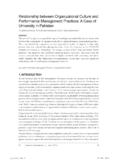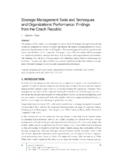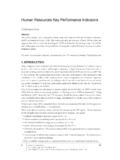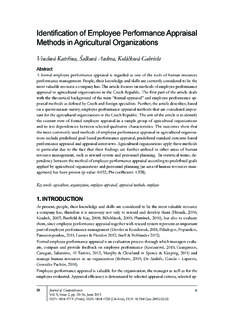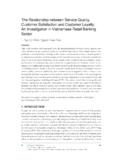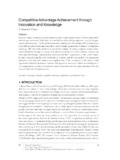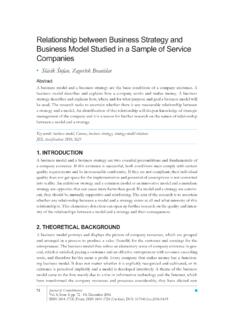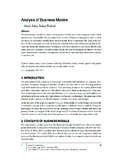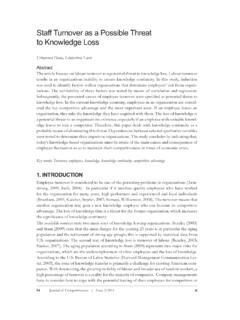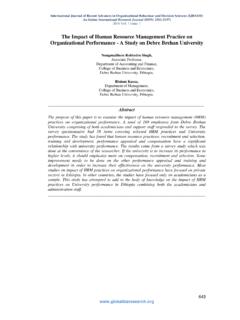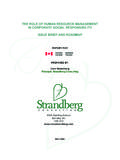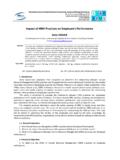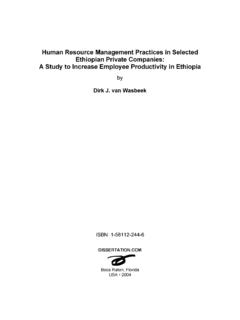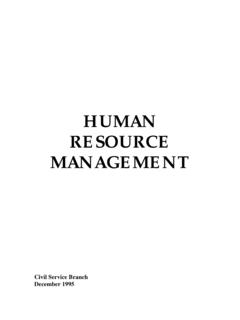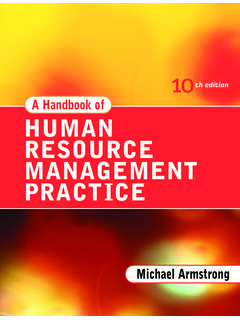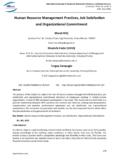Transcription of Impact of Organizational Culture on Human …
1 11 Impact of Organizational Culture on Human resource practices : A Study of Selected Nigerian Private UniversitiesOsibanjo Omotayo Adewale, Adeniji Adenike AnthoniaAbstractThis paper shows results of the Impact of Organizational Culture on Human resource practices in some selected Nigerian private universities. The statistical analysis was based on two hundred and thirty-seven respondents in the selected studied private universities showing that a close re-lationship exists between Organizational Culture and recruitment process, training programmes, job performance management, performance of employees, pay structure, and compensation ad-ministration. The paper suggested that given the Organizational context of the study, each of the variables will be appreciated more by the individuals in values, beliefs, and practices of the organization. It is therefore suggested that prospective employees or job seekers should endeavor to familiarize themselves with the Organizational Culture before accepting job : Organizational Culture , Private Universities, Nigeria, Human resource PracticesJEL Classification: M121.
2 INTRODUCTIONT oday s organization is predominantly dynamic as it poses large opportunities and challenges to the corporate practitioners and policy makers. Understanding such dynamism is very crucial to pursue the Organizational strategic objectives. There have been researches in literature to explore the effect of Organizational Culture on various Human resource development programmes of an organization. For example, scholars including Hofstede, 1980; Ouchi, 1981; Hofstede and Bond, 1988, Kotter and Heskett, 1992; Magee, 2002, claim that Organizational Culture help to provide opportunity and broad structure for the de-velopment of Human resources technical and behavioural skills in an organization. This makes sense because good behavior is driven by ethical values. An organization can guide the conduct of its employees by embedding ethical values in its Culture . However, Organizational excellences could be varied since cultural traits could be source of competitive advantage through casual ambiguity, (Barney, 1991; and Peters and Waterman, 1982).
3 The world is changing rapidly and the level of organizations is also changing due to technological advancements which have af-fected their Human resource developments programmes. Moreover, organizations differ in their cultural content in terms of the relative ordering of beliefs, values and Culture adapts overtime to cope with the dynamic changes and meet the vary-ing demands of the organization in its quest for gaining competitive advantage in all its activi-ties. Therefore, a supportive Culture as noted by Ritchie, (2000) is considered as a motivational instrument which promotes the organization to perform smoothly and ensure success in all its Vol. 5, Issue 4, pp. 115-133, December 2013 ISSN 1804-171X (Print), ISSN 1804-1728 (On-line), DOI: of Competitiveness 17:17:41 Journal of Competitiveness 11 endeavours. Thus, the aim of this paper is to examine the Impact of Organizational Culture on the Human resource development programmes of organizations using selected Nigerian Private Universities as our study case.
4 The choice of Nigerian private universities was based on the fact that these universities were birthed from different perspectives, some are privately owned by Christians and Islamic missionaries, which is evident in the differences that exist amongst them and exhibited in their value, belief, and practices . However, universities owned by the govern-ment (State or Federal) are not captured in this , the paper seeks to answer the following research questions: Does Organizational Culture has any significance influence on the recruitment and selection activity of an organization?Do training and development programmes of an organization affected by the Organizational Culture ?Is there any significant relationship between the Culture of an organization and the compen-sation administration?Are performance management functions of an organization directly related to the organi-zational Culture ?2. LITERATURE Contents of Organizational CultureOrganizational Culture is conceptualized as shared beliefs and values within the organization that helps to shape the behavior patterns of employees (Kotter and Heskett, 1992).
5 Gordon and Cummins (1989) define organization Culture as the drive that recognizes the efforts and con-tributions of the Organizational members and provides holistic understanding of what and how to be achieved, how goals are interrelated, and how each employee could attain goals. Hofstede (1990) summarizes organization Culture as collective process of the mind that differentiates the members of one group from the other one. Thus, we can deduce from above definitions that Organizational Culture could be the means of keeping employees in line and acclimatizing them towards Organizational objectives. Deal and Kennedy, (1982) recognizes the link between Culture and Organizational excellent performances via its Human resource development pro-grammes. These cultural values and Human resource development programmes are consistent with Organizational chosen strategies that led to successful organizations. The Organizational Culture is outlined in Schein (1990) as overall phenomenon of the organization such as natural settings, the rite and rituals, climate, values and programmes of the company performance management, training and development, recruitment and selection, etc.
6 According to Martins and Terblanche (2003), Culture is deeply associated with values and beliefs shared by person-nel in an organization. Organizational Culture relates the employees to Organization s values, norms, stories, beliefs and principles and incorporates these assumptions into them as activity and behavioural set of standards. Klein, (1996) positioned Organizational Culture as the core of organization s activities which has aggregate Impact on its overall effectiveness and the quality of its product and services. Schein (2004) defined Organizational Culture as a dynamic force within 17:17:4111 the organization which is revolving, engaging and interactive and it is shaped up by the employ-ees and management gestures, behaviours and attitudes. Organizational Culture is the basic pattern of shared assumptions, values and beliefs considered to be the correct way of thinking about and acting on problems and opportunities facing the organization.
7 It is what is important and unimportant in the organization. It is often thought of as organization DNA- invisible to the naked eye, yet a powerful template that shapes what happens in the workplace. Hence why Schneider and Smith (2004) argues that Culture begins with leadership and passed on to the Organizational members; it is seen as a set of forces that shape and determine Human behavior. The Culture of an organization is brought about as a result of different factors some of which include the influences of national Culture , previous events in the organization, the different per-sonalities and the socialization individual members experienced as a result of past educational and work settings (Mahler, 1997). It includes the assumptions, values and beliefs of organiza-tion. Assumptions are the shared mental models, the broad worldviews or theories in use that people rely on to guide their perceptions and behaviours, for example, employees assume that the company s integrity to employees/staff compensation administration is one of the keys to the company s survival and success.
8 Organization s beliefs represent the individual s perceptions of reality. Organizations differ in their cultural content in terms of the relative ordering of beliefs, values and assumptions. For instance, some organization practices place a premium on their recruit-ment and selection, training and development programmes, compensation administration and even, performance management. Also, some place a premium on career development, goal set-ting and pay-for-performance, all with the intent of maximizing employee performance and cus-tomer service. This will help to create a Culture of high performance across the organizations support employee wellbeing with free medical care, personal trainers, inex-pensive cafeteria, unlimited sick days, heavily subsidized day care, Culture affects corporate performance. Corporate Culture is a deeply embedded form of social control that influences employee decisions and is pervasive and operates unconsciously. It is an automatic pilot directing employees in ways that are consistent with Organizational Culture is the social glue that bonds people together and makes them feel part of the Organizational experience.
9 Employees are motivated to internalize the organization s domi-nant Culture because it fulfils their needs for social identity. This social glue serves as a way to attract new staff and retain top , corporate Culture assists the sense-making process. It helps employees understand organ-izational events. They can get on with the task at hand rather than spend time trying to figure out what is expected of them. Employees can also communicate more efficiently and reach higher levels of cooperation with each other because they share common mental models of Organizational Culture can also influence the recruitment and selection activities of an or-ganization. This makes sense because good behavior is driven by ethical values. An organization can guide the conduct of its employees by embedding ethical values in its 17:17:41 Journal of Competitiveness 11 Organizational Culture and Recruitment cum employee selection decisions have never been more important to Organizational suc-cess.
10 Organizations need quality staff that can operate in an environment of increasing complex-ity and change. Also, in a business environment where intellectual capital increasingly represents an organization s currency of trade, it is people that create and sustain an organization s competi-tive the wrong person for the job can be costly. The time and expenses associated with adver-tising, agency fees, interviewing candidates and the negative long term financial and non-finan-cial implications of hiring the wrong person make finding and hiring the right person critical. Traditionally, organizations have focused on identifying and selecting people based on their skills and experience. It makes sense if one can find person who has the right set of skills and has done a similar job. There is a good chance that they will be able to perform effectively in a new role. Though skills and experience continue to be important, practice however pointed to motivational fit as a key differentiator in the selection process.
